Dr.Teruo Higa’s
Living A Dream
- 2025
- Sep:#209 The Widespread Use of EM in Ecuador
- Sep:#208 The Widespread Use of EM in Chile
- Jul:#207 Peru, where EM has taken root throughout the country
- May:#206 EM Application Technology in Paraguay Begins to Evolve into Advanced Circular Agriculture
- May:#205 Practical Application of Soil Disinfectant-Free Cultivation Using EM Technology
- Apr:#204 How EM Use Has Spread Throughout the Philippines
- Mar:#203 How to Use EM to Fundamentally Solve the Problem of Agricultural Residue Burning
- Feb:#202 The Spread of EM technology in Germany
- Jan:#201 The 2nd Ichiro Masaki Memorial Universal Village EM International Conference
- Jan:#200 Cleanup of the Ala Wai Canal in Hawaii, where social bonds are strengthened using EM
- 2024
- Nov:#199 EM trials in India with bananas, tomatoes, and pomegranates
- Oct:#198 The Steadily Evolving EM Nature Farming Method at the Blue Sky Palace - Part 8
- Sep:#197 The Steadily Evolving EM Nature Farming Method at the Blue Sky Palace - Part 7
- Aug:#196 The Steadily Evolving EM Nature Farming Method at the Blue Sky Palace - Part 6
- Jul:#195 The Steadily Evolving EM Nature Farming Method at the Blue Sky Palace - Part 5
- Jun:#194 Steadily Evolving EM Nature Farming Method at the Blue Sky Palace - Part 4
- May:#193 Steadily Evolving EM Nature Farming Method at the Blue Sky Palace - Part 3
- May:#192 Steadily Evolving EM Nature Farming Method at the Blue Sky Palace - Part 2
- Apr:#191 Steadily Evolving EM Nature Farming Method at the Blue Sky Palace
- Mar:#190 Quantum Mechanical Effects of EM Gravitron Charcoal
- Mar:#189 The barrier space in Okinawa (Ryukyu Islands) has risen to another dimension
- Jan:#188 Sixty Days after Typhoon No.6
- 2023
- Oct:#187 Supermassive Typhoon No.6 and Subsequent Typhoon No. 11
- Sep:#186 Massive Typhoon No.6 that swallowed the Ryukyu Islands Graviton barrier
- Sep:#185 August 8th is World “EM Mudball Day”
- Aug:#184 A disease-free life depends on the health of the intestinal microbiome.
- Jul:#183 Trial and Error at the Blue-Sky Palace, Part 3
- Jun:#182 Trial and Error at the Blue-Sky Palace, Part 2
- Apr:#181 Trial and Error at the Blue-Sky Palace
- Mar:#180 Ala Wai Canal Cleanup Project in Waikiki, Hawaii
- Feb:#179 High-Yield, High-Quality Rice Production Using EM
- Feb:#178 The Progress the "Soil Preparation Workshop" of the Oishi 3-chan Club (Part 2)
- Jan:#177 Organic Farming Instructional Manual Using EM
- 2022
- Nov:#176 The Typhoon Situation in Okinawa in 2022
- Sep:#175 Third-Party Verification of the Graviton barrier in Okinawa Part-2
- Sep:#174 Third-Party Verification of the Graviton barrier in Okinawa
- Aug:#173 Ecosystem Changes Observed in Okinawa in 2021 Part-5
- Jun:#172 Ecosystem Changes Observed in Okinawa in 2021 Part-4
- May:#171 Ecosystem Changes Observed in Okinawa in 2021 Part-3
- Apr:#170 Ecosystem Changes Observed in Okinawa in 2021 Part-2
- Mar:#169 Koizumi Farm in Kamakura Continues to Evolve
- Feb:#168 Ecosystem Changes Observed in Okinawa in 2021 Part-1
- 2021
- Dec:#167 Enjoying EM Technology While Enriching the Local Ecosystem
- Nov:#166 A Case Study of the Use of EM in a Next Generation Free School in Tune with the Cycles of Nature
- Oct:#165 Typhoon conditions and flowers in Okinawa from August to October
- Sep:#164 Re-learning the origins of river purification using EM Cleaning up the Dairyuji River in Senami (Murakami City, Niigata Prefecture)
- Aug:#163 Measures Against Natural Disasters and Re-learning the Starting Point of EM
- Jul:#162 Summary of FFC (Foods for Children) Okinawa Forum 2021
- Jun:#161 Restoring the Vigor of an Old Tree and Purifying the Environment with EM Technology That Even an Amateur Can Do
- May:#160 The Public is Beginning to Recognize the Use of EM Smokeless Carbonizers
- Apr:#159 EM Hado (EM Graviton) that exerts quantum superposition effect over time
- Mar:#158 Virus-free Okinawan Plants Through Use of an EM Graviton Barrier
- Jan:#157 Enjoyable Farming for Self-Sufficiency that Even Amateurs Can Do
- 2020
- Dec:#156 EM quantum energy effect occurring in Okinawa
- Nov:#155 Implementing EM graviton farming as a flood countermeasure for apple orchards
- Oct:#154 The Latest Book on the Practical Uses of EM "You Are the One Who Draws Out the Power of Microorganisms," by Chizuko Nomoto
- Sep:#153 Application of EM technology to long periods of rain, lack of sunshine, storms, heavy rains, etc.
- Aug:#152 EM application in Kitanakagusuku village plant waste recycling yard
- Jul:#151 Natural Disaster Countermeasures Using EM Technology: Part 2
- Jul:#150 Natural Disaster Countermeasures Using EM Technology
- May:#149 How to make your home and workplace an energy spot by living a complete EM lifestyle: creating the ultimate source of health and environmental purification
- Apr:#148 EM, Viruses and the Pandemic
- Apr:#147 New agriculture applying quantum mechanics Part 2
- Apr:#146 New agriculture applying quantum mechanics
- Apr:#145 Wonderful EM Miracle
- 2019
- Nov:#144 The movie “Revival II” and the reality of Fukushima
- Oct:#143 Boundary dome and foliar spraying of EM・X GOLD and EM 3
- Oct:#142 Kirakira (Sparkling) Summer Vegetable Festa in 2019
- Aug:#141 Excessive salt inevitably causes salt damage
- Jul:#140 Diverse applications of charcoal Part 3
- Jun:#139 Diverse applications of charcoal Part 2
- Jun:#138 Diverse applications of charcoal
- Jun:#137 Purification power of salt
- May:#136 The degree of soil contamination is a reflection of the microflora
- May:#135 Definitive use of EM barriers to deal with typhoons
- May:#134 Implementing authentic Nature Farming
- May:#133 How to enhance healthy Hado (wave energy) by EM
- May:#132 Eating Dirt (Soil)
- May:#131 Hado (Wave energy) involved in health
- May:#130 Reaffirming EM technology to realize the essence of agriculture
- May:#129 The 2nd EM Producer Networking Meeting
- Apr:#128 Understanding the application of seawater and salt in crop cultivation
- Apr:#127 Prevention of Disasters by EM Technology
- Mar:#126 Quantum overlay effective utilization of EM
- Jan:#125 EM Disaster Recovery Support Projects in 2017
- 2018
- 2017
- Aug:#121 Escape from conventional agricultural traps
- Jul:#120 Limitation and important caveats regarding utilization of salt
- Jun:#119 EM Technology to Break Through the Limits of Pesticide-Free Strawberries
- May:#118 Application of barriers using EM rectification force
- Apr:#117 The 1st EM Produce Growers' Networking Conference
- Mar:#116 Sumizo kun: The Ultimate Versatile Carbonization Equipment
- Feb:#115 How to make and use simple carbonized and rectified ash
- Jan:#114 Achievements of 2016
- 2016
- Dec:#113 Definitive Measures Against Typhoons
- Nov:#112 International Conference on Universal Village
- Oct:#111 90% of Your Body is Microbes
- Sep:#110 Disaster Countermeasures Using EM
- Aug:#109: Changes in the Natural Environment by EM Barrier Domes in Okinawa
- Jul:#108: Multi-purpose Utilization of Activated EM with Seawater and Salt
- Jun:#107: Marine Day, when EM Mudballs and Activated EM are Applied Throughout Japan
- May:#106: The Function of EM and Gravitational Waves–Part 3
- Apr:#105: The Function of EM and Gravitational Waves–Part 2
- Feb:#104: The Function of EM and Gravitational Waves
- Feb:#103: The Importance of Phototrophic Bacteria in EM
- 2015
- Dec:#102: Results of Environmental Forum "Utsukushima EM Paradise" 2015
- Nov:#101: Environmental Forum "Utsukushima EM Paradise" 2015
- Oct:#100: A New Phase of Limit Breakthrough Using EM
- Sep:#99: A New Phase of Limit Breakthrough through EM
- Aug:#98: The Tokyo Bay Area Began Creating a Truly Livable Hometown
- Jul:#97: Rectifying Effects of EM
- Jun:#96: Lake Suwa Sousei lecture
- May:#95: In Order to Further Ensure Limit Breakthrough
- Apr:#94: Theatrical Release of the Documentary Film SOSEI-Revival to Enlighten People on the New Possibilities of Microorganisms
- Mar:#93: What Underlies Limit Breakthrough (Part 2)
- Feb:#92: EM Functions to Break Through Limits
- Jan:#91: At the Start of 2015
- 2014
- Dec:#90: Looking Back at 2014
- Nov:#89: Shikoku EM FESTA 2014, Virtuous Circle Conference in Matsuyama, Ehime Prefecture
- Oct:#88: Using EM to Deal with Weather Disasters (Part 2)
- Sep:#87: Current Status of Radioactivity Measures Using EM in Fukushima
- Aug:#86: APNAN (Asia Pacific Natural Agriculture Network) 25th Anniversary Conference in 2014
- Jul:#85: Using EM to Deal with Weather Disasters
- Jun:#84: Substantial Improvement of Soil
- May:#83: The Energy Rectification Force of EM
- Apr:#82: The Annual 18th EM Technology Exchange Meeting and Tohoku Conference in Shichigahama
- Mar:#81: Salmon going upstream in Kitaura (Kasumigaura)
- Feb:#80: The Microbiome Again
- Jan:#79: Inauguration of the Federation of Diet Members Who Use and Apply Effective Microorganisms
- 2013
- Dec:#78: Receiving an Honorary Doctoral Degree from Rajamangala University of Technology in Thailand
- Nov:#77: The Use of EM in School Education in Bhutan
- Oct:#76: Well of Bonding
- Sep:#75: The Background to EM Not Being Employed by Public Institutions to Deal with Radiation
- Aug:#74: Dealing with Disaster: Using EM in Crisis Management
- Jul:#73: EM Events on Ocean Day
- Jun:#72: Using EM to Deal With Heat Stroke and Summer Heat Fatigue
- May:#71: An EM Model Town in Malaysia
- Apr:#70: Steps the Japanese Government is Taking to Deal with Radiation: Are They Really Safe?
- Mar:#69: EM Group Disaster Reconstruction Aid Project in Fukushima
- Feb:#68: EM and Microbiomes (Microbial Flora)
- Jan:#67: A Necessary Evil is Still Evil
- 2012
- Dec:#66: The 17th National EM Technology Exchange Conference / Hokkaido Conference in Sapporo
- Nov:#65: EM Forum 2012 in Okinawa and the Environmental Forum in Fukushima
- Oct:#64: 2012 EM Forum
- Sep:#63: A New Earth Saving Revolution
- Aug:#62: The Asahi Newspaper’s Misguided Reports About EM
- Jul:#61: Using EM in Radioactive Contamination Measures in Fukushima Prefecture
- Jun:#60: The Effects of Using EM to Inhibit the Absorption of Radioactivity as Confirmed in Fukushima
- May:#59: Recovery Support for the Great East Japan Earthquake
- Apr:#58: The Royal Kingdom of Thailand, in which EM Functions as a Set Government Policy
- Mar:#57: Report on the Measures Taken by Kingdom of Thailand Using EM to Deal with Polluted Water
- Feb:#56 EM™ as Part of National Policy in Thailand to Deal with Sanitation Issues Resulting from the Flood of 2011
- Jan:#55 The Law of Syntropy (Revitalization)
- 2011
- Dec:#54 EM Forum 2011
- Nov:#53 Shikoku EM Festa 2011- Zenjunkan no Wa (Virtuous Circle) Tokushima Conference in Naruto -
- Oct:#52 The Mystery of Interim Safety Values for Radioactive Material
- Sep:#51 Successful Radiation Countermeasures Using EM
- Aug:#50 Events on Sea Day in which EM Mud Balls are Thrown into the Water and Activated EM is Applied.
- May:#47 Dealing with the Damage Caused by the Eastern Japan Earthquake
- Apr:#46 Eastern Japan Earthquake
- Mar:#45 The 16th National EM Technology Hokuriku Conference in Fukui
- Feb:#44 More Thoughts on Avian Influenza and Foot-and-Mouth Disease
- Jan:#43 Happy New Year!
- 2010
- Dec:#42 Shikoku EM FESTA 2010・Zenjunkan no wa (Virtuous Circle) Fellowship Conference in Tobe, Ehime Prefecture
- Nov:#41 EM Forum 2010
- Oct:#40: My Thanks to the EM™ Volunteers Who Helped in the Fight Against Foot-and-Mouth Disease in Miyazaki Prefecture
- Sep:#39 International EM Mud Ball Day
- Jul:#37 Poland EM Forum 2010
- Jun:#36 EM Countermeasures Against Foot-and-Mouth Disease
- May:#35 Abnormal Weather
- Apr:#34 EM Activities in Thailand: Finding Solutions to the Challenges Facing the Nation
- Mar:#33 New Developments in the Evolution of EMTM in Thailand
- Feb:#32 Results Starting to Be Seen at the Mikasa Project
- Jan:#31 Towards an EM-Use Society
- 2009
- Dec:#30 EM Summit
- Nov:#29 The System in Penang State in Malaysia that Made the World EMTM Mudball Day a Success
- Oct:#28 The "World EM Mudball Day" in Malaysia
- Sep:#27 Validating EMTM Medicine: Case Study Reports from EM Users 2009. (Part 3)
- Sep:#26 Validating EMTM Medicine: Case Study Reports from EMTM Users 2009. (Part 2)
- Jul:#25 Validating EMTM Medicine: Case Study Reports from EMTM Users 2009. (Part 1)
- Jun:#24 Activities to Disseminate EM-Focused Nature Farming in China
- May:#23 Use of EMTM in Response to Swine Flu
- Apr:#22 Using EM to Solve Public Administrative Costs
- Mar:#21 Reaffirming the Versatility of EM
- Jan:#20 The Beginning of a New Era
- 2008
#99: A New Phase of Limit Breakthrough through EM
The application of EM to eliminate radioactivity has entered the stage of practical use, and we have had steady results in Fukushima. Against this backdrop, atomic conversion by EM has led to a positive technology using salty fertilizer, mainly using seawater, and this technology has begun to spread. The results reveal an ultra limit breakthrough phenomenon that overturns the common sense of the past, and the report this time from Thailand also shows new aspects of limit breakthrough through EM. General Picheto mentioned in the report has overall responsibility for the EM project of the Royal Thai Army, is a national hero is Thailand, and has also appeared in the documentary film, “Sosei-Revival”.
The following is a report from Mr. Koshoji of EMRO Asia.
- - - - - - - - - - - - - - - - - - - - - - - - - - - - - - - - - - - - - - - - - - - - - - - - - - - - - - - - -
[Mr. Koshoji]
The other day, I met General Picheto. Currently, the General, now retired, has been manufacturing and selling EM compost (Bokashi fertilizer). I am reporting the following at his request to Professor Higa about his recent activities.
This year, unusually the rainy season has not yet come and we are facing a long shortage of water. Farmers in this region plow the fields when they have a little rain during the rainy season. All the farmers who have been using the compost made by Gen. Picheto have done likewise, preparing their fields. However, after it sprinkled a little for two days, we had no rain for the next two months, until August.
However, despite the severe drought, many farmers’ rice fields are quite lush and it looks like they will be able to be harvested. I also visited one farmer, and I saw healthy looking offshoots of the rice plants. Below are the photos showing the whole story.
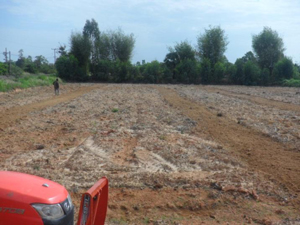

After it rains, EM compost is applied and the soil is tilled.


After tilling, they directly sow the seeds soaked in EM diluted solution.
The person sowing the seeds is a subordinate of Gen. Picheto and is the one who is recommending the use of EM compost to other farmers.


A photo of direct seeding. This person covered the soil with rice straw so that weeds will not grow.


Post-germination. This is a time when there was no rain.
The following photos are of other farmers who were using EM compost.


The soil is quite sandy and they had no rain, yet the rice plants all sprouted vigorously.


As you can see, the rice field itself is very dry and sandy. It has not rained for over two months, however the rice plants have opened in a fan shape with healthy-looking offshoots.
Below is a photo of the rice field to which chemical fertilizer has been applied. The tips of the rice plants have withered and there are no prospects for harvesting. The growth of the plants has stopped.


This photo also shows a plot where chemical fertilizer has been used. Root growth is poor and the plants look likely to die.

On the other hand, here are the rice plants of a farmer who used EM. This person is the head of the local town. He is very surprised how well they are growing in spite of the absence of water.
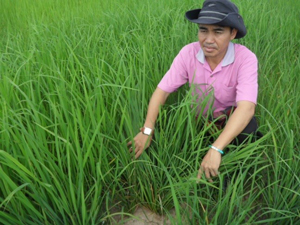
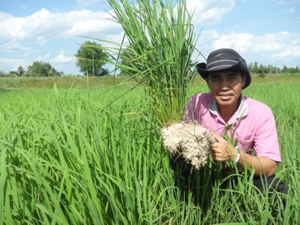
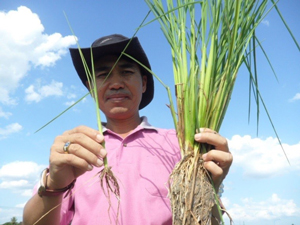
Plants planted at the same time.
The one in his right hand was grown with chemical fertilizer. It has not grown well because of lack of water. The one in his left hand is a rice plant grown using EM compost. It grew with many offshoots full of healthy white roots.
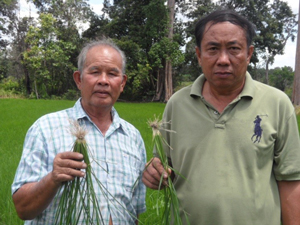
The man on the right has retired from working under former General Picheto. He used EM compost this year and the rice plants in his rice field are also growing well.
It has not rained, but the rice plants are growing very well. The roots are growing vigorously and you can see the difference between these two rice plants.

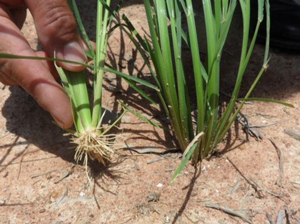
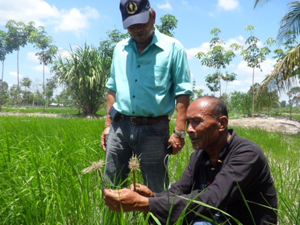
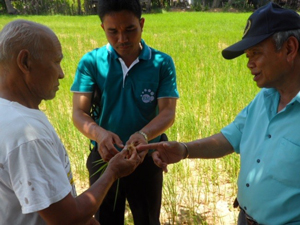
Finally, this is the photo of a farmer you visited last August 10th. The rice plants have grown very well and there are 30-35 offshoots. The farmer says he was worried what will happen because of the lack of rain during the rainy season this year, however he is not worried at all now.

- - - - - - - - - - - - - - - - - - - - - - - - - - - - - - - - - - - - - - - - - - - - - - - - - - - - - - - - -
[Teruo Higa]
In my books and in the Funai Media articles, I introduced cases in which wheat and grass were seeded when there was rainfall, then went through subsequent severe drought, yet grew well.
I wondered why they grew so well without any rain and no water. When I observed the fields carefully in the early morning I saw they were filled with morning dew just like it had rained.
It is clear that the fields to which EM was applied captured a large amount of moisture from the air. If we take advantage of this phenomenon we can see a vision of vast deserts becoming productive farmland.
Editor’s Picks
-
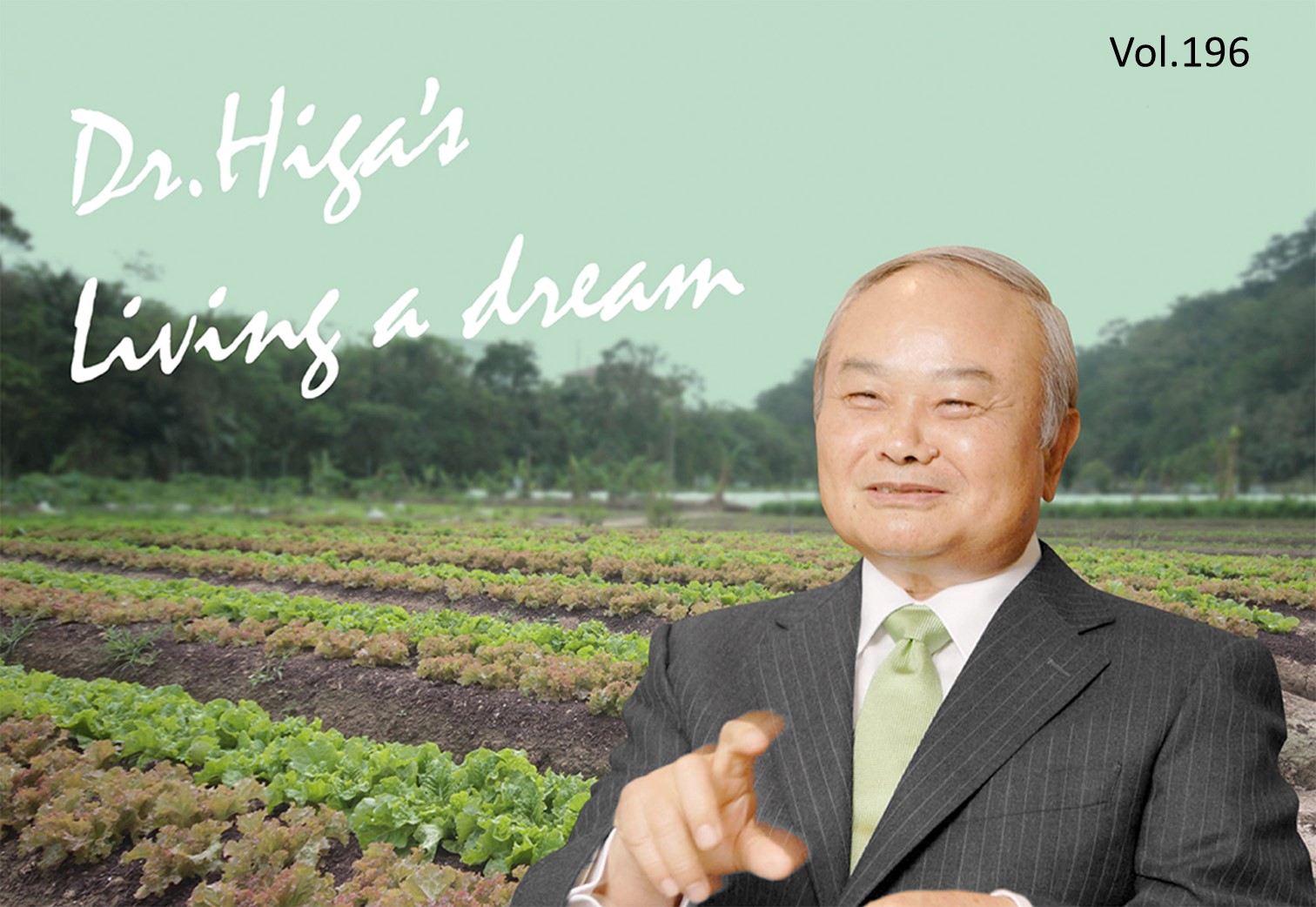
#196 The Steadily Evolving EM Nature Farming Method at the Blue Sky Palace - Part 6 -
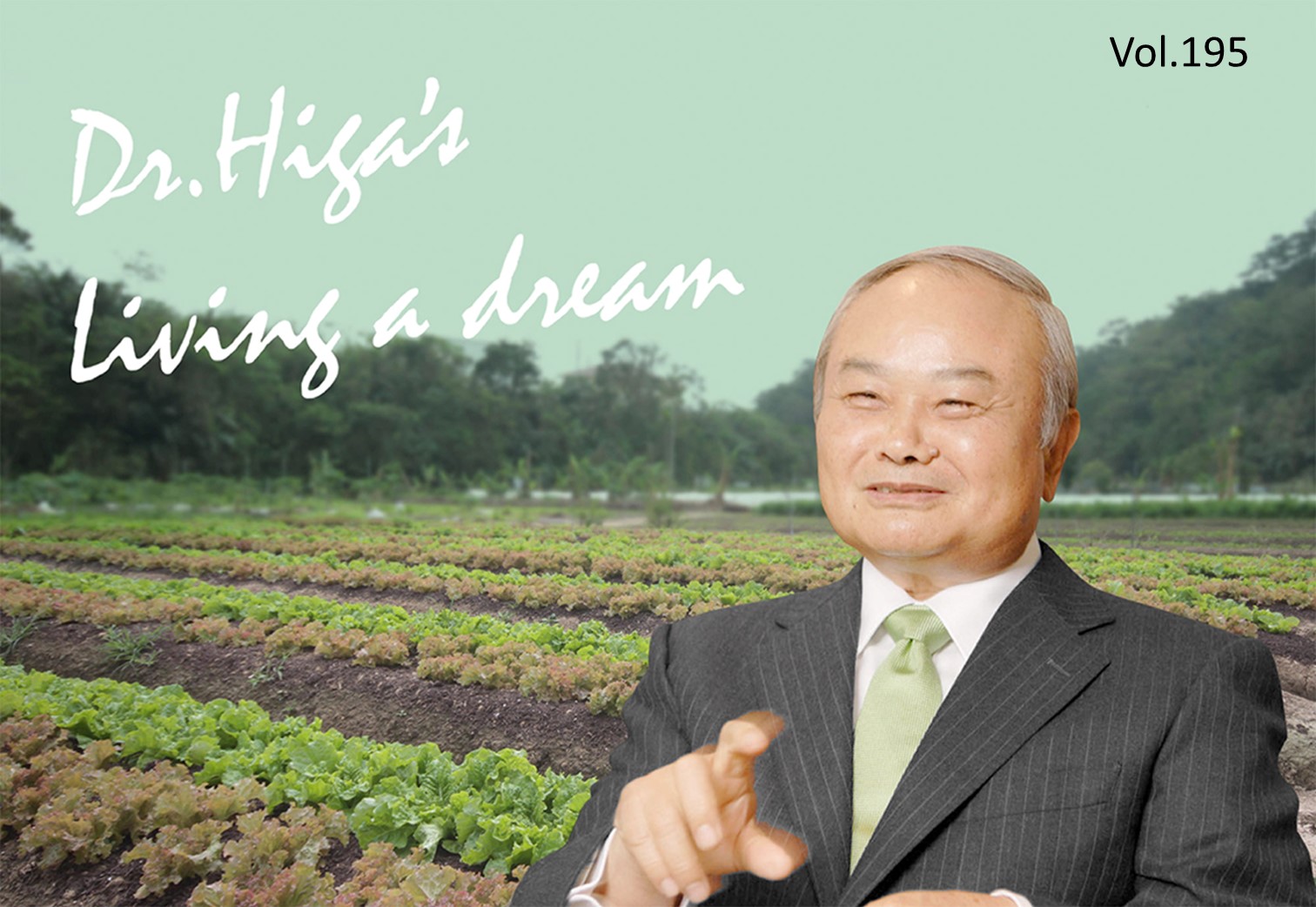
#195 The Steadily Evolving EM Nature Farming Method at the Blue Sky Palace - Part 5 -
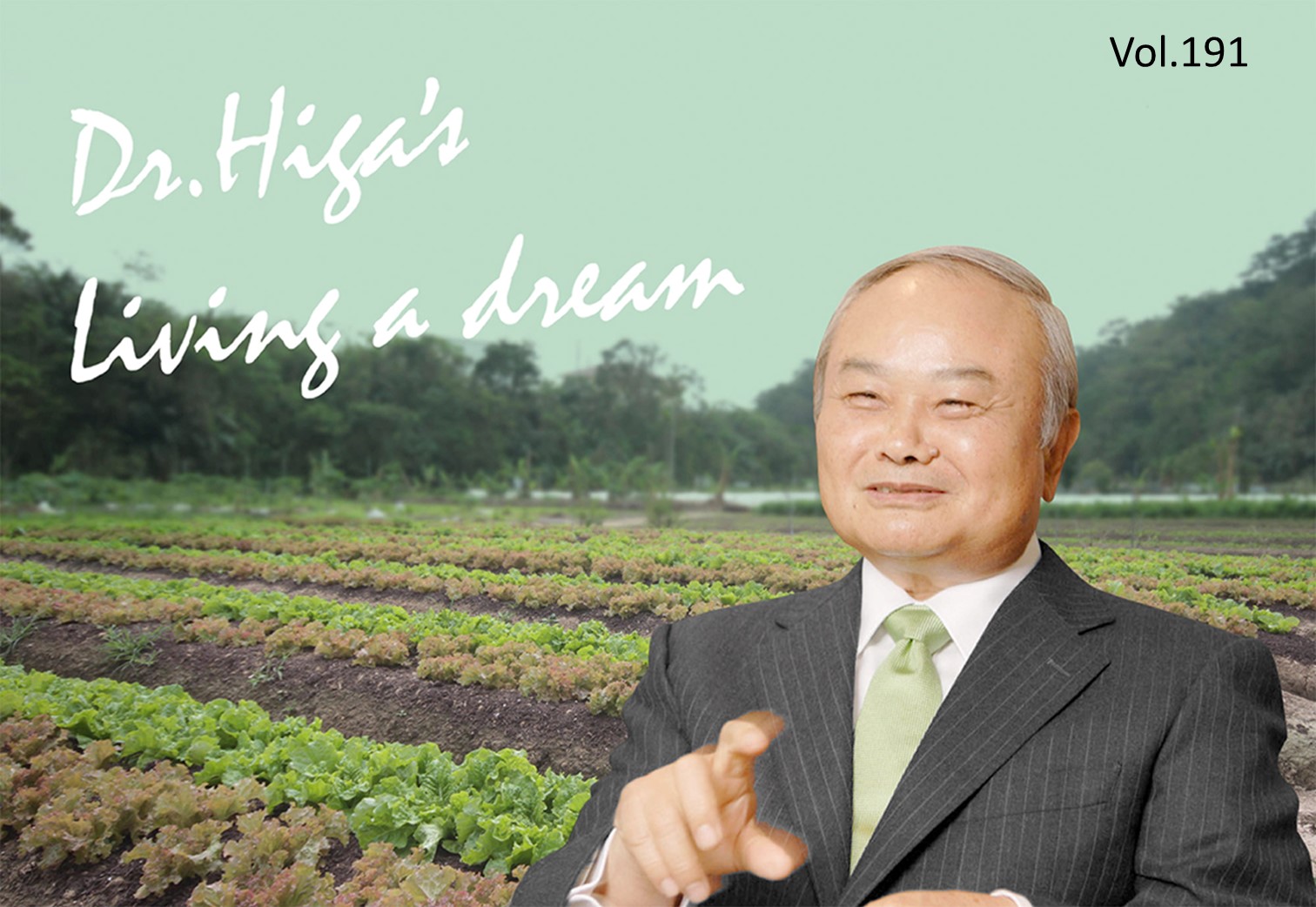
#191 Steadily Evolving EM Nature Farming Method at the Blue Sky Palace -
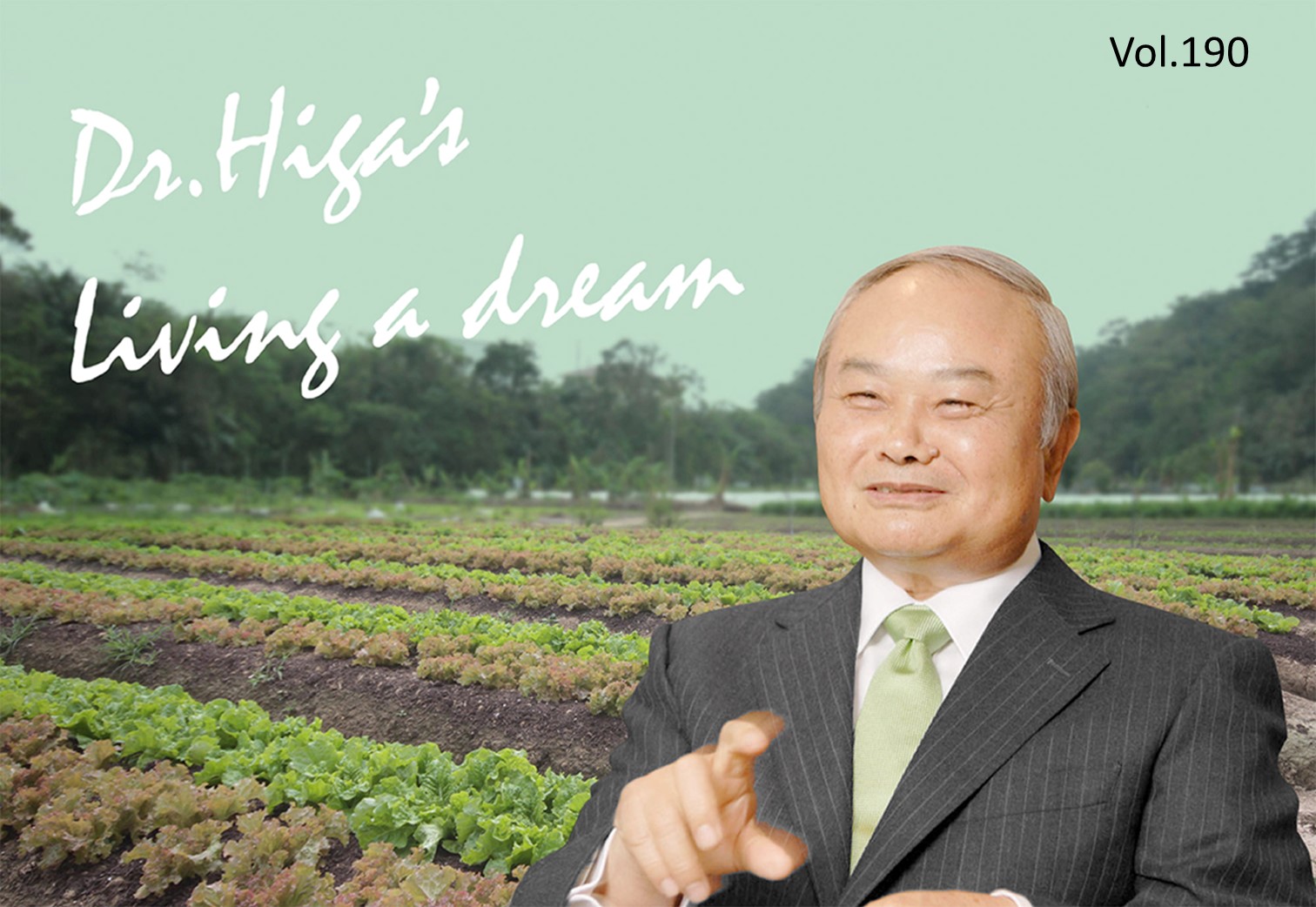
#190 Quantum Mechanical Effects of EM Gravitron Charcoal
- 2025
- Sep:#209 The Widespread Use of EM in Ecuador
- Sep:#208 The Widespread Use of EM in Chile
- Jul:#207 Peru, where EM has taken root throughout the country
- May:#206 EM Application Technology in Paraguay Begins to Evolve into Advanced Circular Agriculture
- May:#205 Practical Application of Soil Disinfectant-Free Cultivation Using EM Technology
- Apr:#204 How EM Use Has Spread Throughout the Philippines
- Mar:#203 How to Use EM to Fundamentally Solve the Problem of Agricultural Residue Burning
- Feb:#202 The Spread of EM technology in Germany
- Jan:#201 The 2nd Ichiro Masaki Memorial Universal Village EM International Conference
- Jan:#200 Cleanup of the Ala Wai Canal in Hawaii, where social bonds are strengthened using EM
- 2024
- Nov:#199 EM trials in India with bananas, tomatoes, and pomegranates
- Oct:#198 The Steadily Evolving EM Nature Farming Method at the Blue Sky Palace - Part 8
- Sep:#197 The Steadily Evolving EM Nature Farming Method at the Blue Sky Palace - Part 7
- Aug:#196 The Steadily Evolving EM Nature Farming Method at the Blue Sky Palace - Part 6
- Jul:#195 The Steadily Evolving EM Nature Farming Method at the Blue Sky Palace - Part 5
- Jun:#194 Steadily Evolving EM Nature Farming Method at the Blue Sky Palace - Part 4
- May:#193 Steadily Evolving EM Nature Farming Method at the Blue Sky Palace - Part 3
- May:#192 Steadily Evolving EM Nature Farming Method at the Blue Sky Palace - Part 2
- Apr:#191 Steadily Evolving EM Nature Farming Method at the Blue Sky Palace
- Mar:#190 Quantum Mechanical Effects of EM Gravitron Charcoal
- Mar:#189 The barrier space in Okinawa (Ryukyu Islands) has risen to another dimension
- Jan:#188 Sixty Days after Typhoon No.6
- 2023
- Oct:#187 Supermassive Typhoon No.6 and Subsequent Typhoon No. 11
- Sep:#186 Massive Typhoon No.6 that swallowed the Ryukyu Islands Graviton barrier
- Sep:#185 August 8th is World “EM Mudball Day”
- Aug:#184 A disease-free life depends on the health of the intestinal microbiome.
- Jul:#183 Trial and Error at the Blue-Sky Palace, Part 3
- Jun:#182 Trial and Error at the Blue-Sky Palace, Part 2
- Apr:#181 Trial and Error at the Blue-Sky Palace
- Mar:#180 Ala Wai Canal Cleanup Project in Waikiki, Hawaii
- Feb:#179 High-Yield, High-Quality Rice Production Using EM
- Feb:#178 The Progress the "Soil Preparation Workshop" of the Oishi 3-chan Club (Part 2)
- Jan:#177 Organic Farming Instructional Manual Using EM
- 2022
- Nov:#176 The Typhoon Situation in Okinawa in 2022
- Sep:#175 Third-Party Verification of the Graviton barrier in Okinawa Part-2
- Sep:#174 Third-Party Verification of the Graviton barrier in Okinawa
- Aug:#173 Ecosystem Changes Observed in Okinawa in 2021 Part-5
- Jun:#172 Ecosystem Changes Observed in Okinawa in 2021 Part-4
- May:#171 Ecosystem Changes Observed in Okinawa in 2021 Part-3
- Apr:#170 Ecosystem Changes Observed in Okinawa in 2021 Part-2
- Mar:#169 Koizumi Farm in Kamakura Continues to Evolve
- Feb:#168 Ecosystem Changes Observed in Okinawa in 2021 Part-1
- 2021
- Dec:#167 Enjoying EM Technology While Enriching the Local Ecosystem
- Nov:#166 A Case Study of the Use of EM in a Next Generation Free School in Tune with the Cycles of Nature
- Oct:#165 Typhoon conditions and flowers in Okinawa from August to October
- Sep:#164 Re-learning the origins of river purification using EM Cleaning up the Dairyuji River in Senami (Murakami City, Niigata Prefecture)
- Aug:#163 Measures Against Natural Disasters and Re-learning the Starting Point of EM
- Jul:#162 Summary of FFC (Foods for Children) Okinawa Forum 2021
- Jun:#161 Restoring the Vigor of an Old Tree and Purifying the Environment with EM Technology That Even an Amateur Can Do
- May:#160 The Public is Beginning to Recognize the Use of EM Smokeless Carbonizers
- Apr:#159 EM Hado (EM Graviton) that exerts quantum superposition effect over time
- Mar:#158 Virus-free Okinawan Plants Through Use of an EM Graviton Barrier
- Jan:#157 Enjoyable Farming for Self-Sufficiency that Even Amateurs Can Do
- 2020
- Dec:#156 EM quantum energy effect occurring in Okinawa
- Nov:#155 Implementing EM graviton farming as a flood countermeasure for apple orchards
- Oct:#154 The Latest Book on the Practical Uses of EM "You Are the One Who Draws Out the Power of Microorganisms," by Chizuko Nomoto
- Sep:#153 Application of EM technology to long periods of rain, lack of sunshine, storms, heavy rains, etc.
- Aug:#152 EM application in Kitanakagusuku village plant waste recycling yard
- Jul:#151 Natural Disaster Countermeasures Using EM Technology: Part 2
- Jul:#150 Natural Disaster Countermeasures Using EM Technology
- May:#149 How to make your home and workplace an energy spot by living a complete EM lifestyle: creating the ultimate source of health and environmental purification
- Apr:#148 EM, Viruses and the Pandemic
- Apr:#147 New agriculture applying quantum mechanics Part 2
- Apr:#146 New agriculture applying quantum mechanics
- Apr:#145 Wonderful EM Miracle
- 2019
- Nov:#144 The movie “Revival II” and the reality of Fukushima
- Oct:#143 Boundary dome and foliar spraying of EM・X GOLD and EM 3
- Oct:#142 Kirakira (Sparkling) Summer Vegetable Festa in 2019
- Aug:#141 Excessive salt inevitably causes salt damage
- Jul:#140 Diverse applications of charcoal Part 3
- Jun:#139 Diverse applications of charcoal Part 2
- Jun:#138 Diverse applications of charcoal
- Jun:#137 Purification power of salt
- May:#136 The degree of soil contamination is a reflection of the microflora
- May:#135 Definitive use of EM barriers to deal with typhoons
- May:#134 Implementing authentic Nature Farming
- May:#133 How to enhance healthy Hado (wave energy) by EM
- May:#132 Eating Dirt (Soil)
- May:#131 Hado (Wave energy) involved in health
- May:#130 Reaffirming EM technology to realize the essence of agriculture
- May:#129 The 2nd EM Producer Networking Meeting
- Apr:#128 Understanding the application of seawater and salt in crop cultivation
- Apr:#127 Prevention of Disasters by EM Technology
- Mar:#126 Quantum overlay effective utilization of EM
- Jan:#125 EM Disaster Recovery Support Projects in 2017
- 2018
- 2017
- Aug:#121 Escape from conventional agricultural traps
- Jul:#120 Limitation and important caveats regarding utilization of salt
- Jun:#119 EM Technology to Break Through the Limits of Pesticide-Free Strawberries
- May:#118 Application of barriers using EM rectification force
- Apr:#117 The 1st EM Produce Growers' Networking Conference
- Mar:#116 Sumizo kun: The Ultimate Versatile Carbonization Equipment
- Feb:#115 How to make and use simple carbonized and rectified ash
- Jan:#114 Achievements of 2016
- 2016
- Dec:#113 Definitive Measures Against Typhoons
- Nov:#112 International Conference on Universal Village
- Oct:#111 90% of Your Body is Microbes
- Sep:#110 Disaster Countermeasures Using EM
- Aug:#109: Changes in the Natural Environment by EM Barrier Domes in Okinawa
- Jul:#108: Multi-purpose Utilization of Activated EM with Seawater and Salt
- Jun:#107: Marine Day, when EM Mudballs and Activated EM are Applied Throughout Japan
- May:#106: The Function of EM and Gravitational Waves–Part 3
- Apr:#105: The Function of EM and Gravitational Waves–Part 2
- Feb:#104: The Function of EM and Gravitational Waves
- Feb:#103: The Importance of Phototrophic Bacteria in EM
- 2015
- Dec:#102: Results of Environmental Forum "Utsukushima EM Paradise" 2015
- Nov:#101: Environmental Forum "Utsukushima EM Paradise" 2015
- Oct:#100: A New Phase of Limit Breakthrough Using EM
- Sep:#99: A New Phase of Limit Breakthrough through EM
- Aug:#98: The Tokyo Bay Area Began Creating a Truly Livable Hometown
- Jul:#97: Rectifying Effects of EM
- Jun:#96: Lake Suwa Sousei lecture
- May:#95: In Order to Further Ensure Limit Breakthrough
- Apr:#94: Theatrical Release of the Documentary Film SOSEI-Revival to Enlighten People on the New Possibilities of Microorganisms
- Mar:#93: What Underlies Limit Breakthrough (Part 2)
- Feb:#92: EM Functions to Break Through Limits
- Jan:#91: At the Start of 2015
- 2014
- Dec:#90: Looking Back at 2014
- Nov:#89: Shikoku EM FESTA 2014, Virtuous Circle Conference in Matsuyama, Ehime Prefecture
- Oct:#88: Using EM to Deal with Weather Disasters (Part 2)
- Sep:#87: Current Status of Radioactivity Measures Using EM in Fukushima
- Aug:#86: APNAN (Asia Pacific Natural Agriculture Network) 25th Anniversary Conference in 2014
- Jul:#85: Using EM to Deal with Weather Disasters
- Jun:#84: Substantial Improvement of Soil
- May:#83: The Energy Rectification Force of EM
- Apr:#82: The Annual 18th EM Technology Exchange Meeting and Tohoku Conference in Shichigahama
- Mar:#81: Salmon going upstream in Kitaura (Kasumigaura)
- Feb:#80: The Microbiome Again
- Jan:#79: Inauguration of the Federation of Diet Members Who Use and Apply Effective Microorganisms
- 2013
- Dec:#78: Receiving an Honorary Doctoral Degree from Rajamangala University of Technology in Thailand
- Nov:#77: The Use of EM in School Education in Bhutan
- Oct:#76: Well of Bonding
- Sep:#75: The Background to EM Not Being Employed by Public Institutions to Deal with Radiation
- Aug:#74: Dealing with Disaster: Using EM in Crisis Management
- Jul:#73: EM Events on Ocean Day
- Jun:#72: Using EM to Deal With Heat Stroke and Summer Heat Fatigue
- May:#71: An EM Model Town in Malaysia
- Apr:#70: Steps the Japanese Government is Taking to Deal with Radiation: Are They Really Safe?
- Mar:#69: EM Group Disaster Reconstruction Aid Project in Fukushima
- Feb:#68: EM and Microbiomes (Microbial Flora)
- Jan:#67: A Necessary Evil is Still Evil
- 2012
- Dec:#66: The 17th National EM Technology Exchange Conference / Hokkaido Conference in Sapporo
- Nov:#65: EM Forum 2012 in Okinawa and the Environmental Forum in Fukushima
- Oct:#64: 2012 EM Forum
- Sep:#63: A New Earth Saving Revolution
- Aug:#62: The Asahi Newspaper’s Misguided Reports About EM
- Jul:#61: Using EM in Radioactive Contamination Measures in Fukushima Prefecture
- Jun:#60: The Effects of Using EM to Inhibit the Absorption of Radioactivity as Confirmed in Fukushima
- May:#59: Recovery Support for the Great East Japan Earthquake
- Apr:#58: The Royal Kingdom of Thailand, in which EM Functions as a Set Government Policy
- Mar:#57: Report on the Measures Taken by Kingdom of Thailand Using EM to Deal with Polluted Water
- Feb:#56 EM™ as Part of National Policy in Thailand to Deal with Sanitation Issues Resulting from the Flood of 2011
- Jan:#55 The Law of Syntropy (Revitalization)
- 2011
- Dec:#54 EM Forum 2011
- Nov:#53 Shikoku EM Festa 2011- Zenjunkan no Wa (Virtuous Circle) Tokushima Conference in Naruto -
- Oct:#52 The Mystery of Interim Safety Values for Radioactive Material
- Sep:#51 Successful Radiation Countermeasures Using EM
- Aug:#50 Events on Sea Day in which EM Mud Balls are Thrown into the Water and Activated EM is Applied.
- May:#47 Dealing with the Damage Caused by the Eastern Japan Earthquake
- Apr:#46 Eastern Japan Earthquake
- Mar:#45 The 16th National EM Technology Hokuriku Conference in Fukui
- Feb:#44 More Thoughts on Avian Influenza and Foot-and-Mouth Disease
- Jan:#43 Happy New Year!
- 2010
- Dec:#42 Shikoku EM FESTA 2010・Zenjunkan no wa (Virtuous Circle) Fellowship Conference in Tobe, Ehime Prefecture
- Nov:#41 EM Forum 2010
- Oct:#40: My Thanks to the EM™ Volunteers Who Helped in the Fight Against Foot-and-Mouth Disease in Miyazaki Prefecture
- Sep:#39 International EM Mud Ball Day
- Jul:#37 Poland EM Forum 2010
- Jun:#36 EM Countermeasures Against Foot-and-Mouth Disease
- May:#35 Abnormal Weather
- Apr:#34 EM Activities in Thailand: Finding Solutions to the Challenges Facing the Nation
- Mar:#33 New Developments in the Evolution of EMTM in Thailand
- Feb:#32 Results Starting to Be Seen at the Mikasa Project
- Jan:#31 Towards an EM-Use Society
- 2009
- Dec:#30 EM Summit
- Nov:#29 The System in Penang State in Malaysia that Made the World EMTM Mudball Day a Success
- Oct:#28 The "World EM Mudball Day" in Malaysia
- Sep:#27 Validating EMTM Medicine: Case Study Reports from EM Users 2009. (Part 3)
- Sep:#26 Validating EMTM Medicine: Case Study Reports from EMTM Users 2009. (Part 2)
- Jul:#25 Validating EMTM Medicine: Case Study Reports from EMTM Users 2009. (Part 1)
- Jun:#24 Activities to Disseminate EM-Focused Nature Farming in China
- May:#23 Use of EMTM in Response to Swine Flu
- Apr:#22 Using EM to Solve Public Administrative Costs
- Mar:#21 Reaffirming the Versatility of EM
- Jan:#20 The Beginning of a New Era
- 2008
